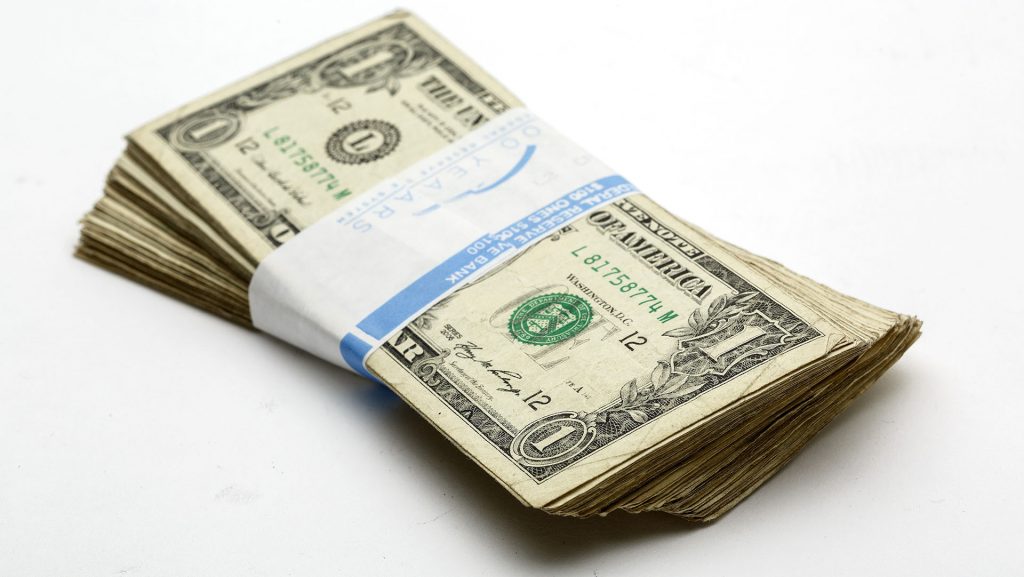Banerjee: BuzzFeed’s moneymaking scheme will shock you
BuzzFeed, land of click-bait and addictive personality quizzes, recently laid off two prominent news desks in order to make way for more marketable content. That new content? It’s being written by community users.
A stack of one dollar bills is one of the essential items for preparing yourself for the next big earthquake. (Ricardo DeAratanha/Los Angeles Times/TNS)
February 5, 2019
On Jan. 25, BuzzFeed, a prominent entertainment company, laid off the entirety of the National News and National Security desks in the name of focusing on “content that is working,” according to CEO Jonah Peretti. However, what Peretti didn’t mention is that much of the content that is working has been created by unpaid community creators.
The so-called “BuzzFeed Community” is a prominent part of the website’s appeal. Going to its “Quiz” section, a division that gets a good majority of the web traffic, four out of the top five quizzes are community-generated. This means that readers with some spare time are making lucrative quizzes for BuzzFeed for absolutely no recompense.
Around the same time as the layoffs occurred, it came out that a 19-year-old college student and active BuzzFeed community member, Rachel McMahon, has become the fifth-highest traffic generator for the website. McMahon has made nearly 700 quizzes since 2017. Her work has been heavily monetized by the website, but she only received gift cards and merchandising from the corporation.
RELATED: Peckman: A somewhat comprehensive glimpse into this year’s Super Bowl ads
Regardless of the fun and relatable content that BuzzFeed regularly puts out, it is not your friend. No, the giant media company does not have your best interests in mind.
This isn’t surprising for anyone — I don’t think we expect somewhat faceless corporate entities to truly care about our well-being. But what may be less intuitive is what happens to our content once we give it to BuzzFeed.
…we should demand better treatment from the places from which we get our entertainment and news.
BuzzFeed has made a name on, for all practical purposes, capitalizing on the labor of other (often funnier) people. Routinely, Tumblr posts and tweets will be used in BuzzFeed “articles,” which are simply the summation of the work of others, with a caption. The comics who come up with the content that fills much of BuzzFeed are, of course, unpaid, no matter how many times they’re featured. People such as McMahon, whose content drives a good deal of BuzzFeed’s revenue, are also unpaid.
RELATED: Column: MAGA is becoming a symbol of white supremacy
Despite what you think, your funny tweet or your somewhat scathing “hot take” on Facebook are marketable. BuzzFeed has been doing it for years. If BuzzFeed writers believe your content is good enough to go on the website, they believe they can make money off of it — they believe you could have made money on it, if you had decided to properly market it.
The problem with BuzzFeed is largely that it would prefer to simply conglomerate ideas from other people than put out genuinely good and insightful articles, content which often came from desks such as National News. And, we’re letting it do so by giving up our content for the world on social media.
This is twofold: On one hand, the community is being siphoned for its money-generating content, and on the other, the actual writers who are being paid are losing opportunities to make money because of the community options. Because of this, it is imperative that we actively consider how we treat our work’s value.
RELATED: Neal: When masculinity becomes toxic
BuzzFeed’s layoffs spell out trouble for the journalism community, because numerous people have lost their source of income, but it also addresses a larger problem of mass-entertainment companies co-opting the talent of people they do not plan to ever pay. In the wake of this, we should demand better treatment from the places from which we get our entertainment and news.




















